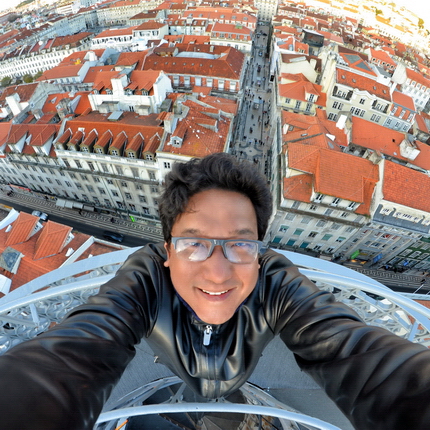
Eminent historian of Philosophy, the late Frederick Copleston discusses the cultured, pessimistic and if I may add, the arrogant, embittered and individualistic Arthur Schopenhauer (arguably a curiosity among western philosophers, for being one of the few pessimists in philosophy). ‘The World as Will and Idea’ (also known as ‘The World as Will and Representation)’, of course, is monumental. Believing that will was inherently evil, he argued that the best one could strive for was renunciation of desire, a temporary absence of pain through the contemplation of high art. Schopenhauer is therefore, probably also the artists philosopher! And yes, he spent a quarter of a century without talking to his mother, and probably one of the few westerners to find proximity in eastern Hinduism and Buddhism. His rejection of the action-minded, essentially bourgeois confidence of the 19th C presaged the individualistic despair of the 20th C. We do know individualistic despair, all of us.

 Its really good to see you Milindo, with such awesome stuff from you as usual.. loved your blog as well!
Its really good to see you Milindo, with such awesome stuff from you as usual.. loved your blog as well! Hi Milindo, hope you are inspiring many more around you…wherever you are!
Hi Milindo, hope you are inspiring many more around you…wherever you are! Your courses were always the best. By the way, just went through a bit of your website. It’s great! Some good stuff in there that I wouldn’t normally chance upon
Your courses were always the best. By the way, just went through a bit of your website. It’s great! Some good stuff in there that I wouldn’t normally chance upon Photo gallery
Photo gallery Photo gallery
Photo gallery Photo gallery
Photo gallery hope you’re changing the world as always :)
hope you’re changing the world as always :) Photo gallery
Photo gallery Photo gallery
Photo gallery Photo gallery
Photo gallery Photo gallery
Photo gallery I discover TL of a writer and respected intellectual, with a tolerant, global conscience: @GhoshAmitav – tx @Milindo_Taid
I discover TL of a writer and respected intellectual, with a tolerant, global conscience: @GhoshAmitav – tx @Milindo_Taid Photo gallery
Photo gallery Milind never told u but u were my first true inspiration….I almost learnt the guitar watching u play…..thanx for being there
Milind never told u but u were my first true inspiration….I almost learnt the guitar watching u play…..thanx for being there Photo gallery
Photo gallery Photo gallery
Photo gallery Your website is full of delightful posts. I’m going to have to watch where my time goes when I’m visiting! :)
Your website is full of delightful posts. I’m going to have to watch where my time goes when I’m visiting! :) With all the magical places you are checking off your bucket list! I want to know how to be you :)
With all the magical places you are checking off your bucket list! I want to know how to be you :) This is by far amongst the best curated creative content sites out there and the eye and vision of one man, when good, works better than any funded team. Inspired enormously once again :)
This is by far amongst the best curated creative content sites out there and the eye and vision of one man, when good, works better than any funded team. Inspired enormously once again :) Photo gallery
Photo gallery Photo gallery
Photo gallery Still a fan of your unique and sweet finger strum on acoustic guitar. It made an ordinary guitar sound great. Would just love to see and hear one of those too.
Still a fan of your unique and sweet finger strum on acoustic guitar. It made an ordinary guitar sound great. Would just love to see and hear one of those too. veryveryinterestingwebsite.have been visiting! thankyou!
veryveryinterestingwebsite.have been visiting! thankyou! You have inspired so many. :)
You have inspired so many. :) i really like your blog – good interesting stuff as always !
i really like your blog – good interesting stuff as always ! Milindo Taid – ace teacher, rockstar guide to my projects at film school, guitarist and photographer too. Really good human being as well
Milindo Taid – ace teacher, rockstar guide to my projects at film school, guitarist and photographer too. Really good human being as well great blog :)
great blog :) Never thought I’d say this, but it was the most interesting classes I’ve sat in.. and of course, the day you played Sultans of Swing for us. Hope you continue to influence the next generations with your dynamic yet simple teachings.
Never thought I’d say this, but it was the most interesting classes I’ve sat in.. and of course, the day you played Sultans of Swing for us. Hope you continue to influence the next generations with your dynamic yet simple teachings. Photo Gallery
Photo Gallery Photo Gallery
Photo Gallery You’re a role model sir, such awesomeness !!! :D
You’re a role model sir, such awesomeness !!! :D Photo gallery
Photo gallery love ur pics…they are like those moments which u capture in your mind and wished u had a camera right at that moment to capture it…but u actually do capture them :) beautiful…!!!
love ur pics…they are like those moments which u capture in your mind and wished u had a camera right at that moment to capture it…but u actually do capture them :) beautiful…!!! You are the only faculty member I could connect to!
You are the only faculty member I could connect to! Love your site Milindo. I was excited to see you displaying my husband’s watermelon carvings
Love your site Milindo. I was excited to see you displaying my husband’s watermelon carvings OMG its like a painting!! you have taken photography to another level!!!
OMG its like a painting!! you have taken photography to another level!!! Photo gallery
Photo gallery Absolutely amazing blog – a chest full of treasure.
Absolutely amazing blog – a chest full of treasure. You are inimitable!
You are inimitable! Grt milindo. eachtime want to check out something good on net…know where to go now!
Grt milindo. eachtime want to check out something good on net…know where to go now! #NowFollowing @Milindo_Taid One of the most influential n interesting mentor from my design school. Always loaded. :)
#NowFollowing @Milindo_Taid One of the most influential n interesting mentor from my design school. Always loaded. :) We need more teachers like you :)
We need more teachers like you :) Guitar in your hand reminds me of the MCRC days! You are terrific… :)
Guitar in your hand reminds me of the MCRC days! You are terrific… :) I was just looking at your website… amazing it is… full of knowledge as always..
I was just looking at your website… amazing it is… full of knowledge as always.. Photo gallery
Photo gallery Photo gallery
Photo gallery Oldest operating bookstore
Oldest operating bookstore Photo gallery
Photo gallery You are awesome :)
You are awesome :) So glad you enjoyed my photos, really honored to be featured on your blog. thank you sir!
So glad you enjoyed my photos, really honored to be featured on your blog. thank you sir! You’ll love this site by the awesome Milindo Taid
You’ll love this site by the awesome Milindo Taid Photo gallery
Photo gallery Photo Gallery
Photo Gallery
Fr. Copleston, in his famous debate with Betrand Russell on the existence of god, questions Russell on what basis he makes moral judgements. Copleston implies that, in the final analysis, an athiest can only resort either to his own feelings or to the rule of the majority (either of which lead to counterexamples – the deluded psychopath or majority opinion in Nazi Germany). Copleston himself obviously believes that, as a Christian, he himself can make his moral judgements by relying on god. However, no Christian (or theist) except a mad one would claim to know God’s thoughts. So surely the… Read more »